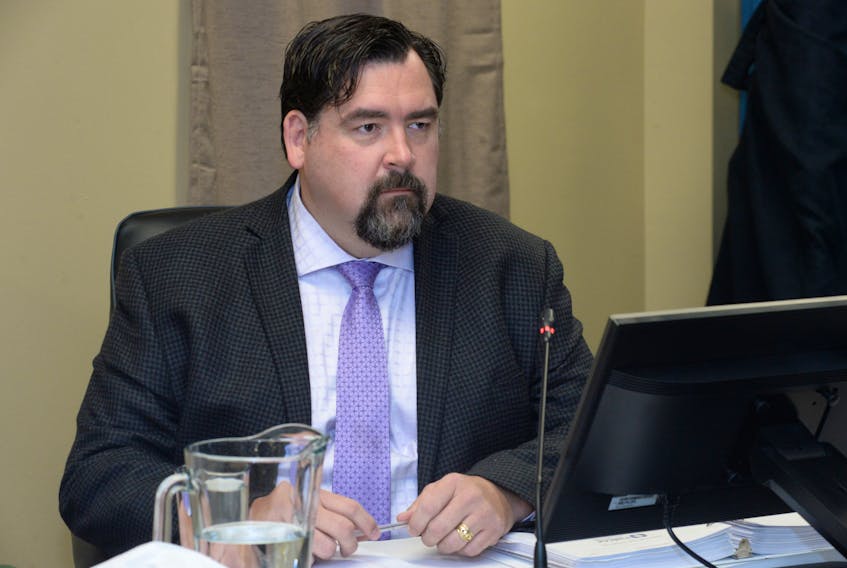Nalcor Energy’s Muskrat Falls project management team set out clear guidelines for contractors, followed through on their commitments and are not to blame for billions of dollars in overruns on the megaproject, says generation project manager Scott O’Brien.
O’Brien began testimony at the Muskrat Falls Inquiry on Thursday and continued through Friday, offering some details of the management process. Along the way, he rejected previous criticisms levelled at the project management team.
One of the common topics relating to the project team was the level of on-site authority and day-to-day management. More than one witness, including former site manager and Nalcor project management team member Des Tranquilla, testified they were used to greater on-site authority, or expected greater on-site authority.
But O’Brien denied there’s any merit to claims of not enough authority on site.
The project management team worked off approval processes established with Nalcor Energy’s senior leadership, he said, and the processes were clearly communicated to all contractors coming in.
He highlighted a difference between decision-making authority in terms of spending approvals to support construction, and authority for signing off larger project changes.
At one point, he described testimony to date around the approval processes as, “an oversimplification of what’s really a very complex problem.”
Generally at the site, Nalcor’s frontline construction managers could approve additional work, like moving or changing a piece of rebar, up to $25,000. He said, at site, there were also managers able to approve up to $250,000 in spending.
But larger changes, requiring change orders, were different. Those changes could, for example, require approvals from the engineer of record. And O’Brien said those changes went through the main “home office” (in St. John’s) with specific purpose of maintaining control of the project.
He said he could not agree with statements made during questioning by Inquiry co-counsel Irene Muzychka, suggesting the project team’s approach contributed to cost overruns.
“I think you have to look back to — within the generation project — where did the cost growth come from?” he said.
When the bids were all in for contract packages, he said, they were higher than anticipated. He argued the market on its own added about $1 billion to the price of the generation project.
Then there were the costs associated with the work assigned to Astaldi Canada. He referenced knock-on effects, being cost increases to other contract packages, given Astaldi and its subcontractors did not meet the project plans.
“That takes the overall cost of Muskrat Falls Generation to between $5 billion and $5.1 billion. And the delta is about $400 million. Within that $400 million exists the cost of weather, the cost of protest, the cost of the cofferdam repair and other things, and the true cost delta associated with the execution at Muskrat — aside from the impact of Astaldi’s poor performance and delay — is really only about six to seven per cent of the overall project value,” he said.
“And that’s what we’re really talking about managing here as a project management team or as an execution team at site.”
He was asked about claims of aggressive behaviour, referred to as bullying behaviour by some of the lawyers in the room. In response, he spoke to the importance of professional decorum, and denied acting unprofessionally at any time.
“I will tell you, as with any construction program, there are tense discussions. There are disagreements with respect to commercial issues. I can tell you I have been in meetings with Astaldi in which language was used, shouting was used, people left and stormed out of rooms. I don’t condone that, either,” he said.
He said people weren’t bullied on the project. They were simply held to the standards set out when they signed on, and sometimes the contractors didn’t like it.
O’Brien was asked specifically about a letter in 2016 and subsequent testimony at the Inquiry from Astaldi project manager Don Delarosbil, saying O’Brien acted inappropriately in dealing with Astaldi representatives, exhibiting “aggressive and intimidating” behaviour. In response, O’Brien said Delarosbil’s allegations would “of course” be only to forward the contractor’s commercial interests.
Later in the day, Astaldi lawyer Paul Burgess directly asked O’Brien if he was saying Delarosbil’s testimony at the inquiry was false. In response, O’Brien said he could not say if it was true or false, and he was only contextualizing it.
At this point, the Inquiry is seeing specific, conflicting statements under oath, as in this example.
There was no explicit reference to perjury during the hearing, but for clarity, under Canadian law, the charge of perjury applies to cases of false statements under oath, in cases where it’s believed there was a specific attempt to mislead.
If there is no evidence of an attempt to mislead, it would simply be conflicting statements, left to Commissioner Richard LeBlanc to weigh, in the process of examining the evidence and coming to conclusions for his final report.
RELATED:









